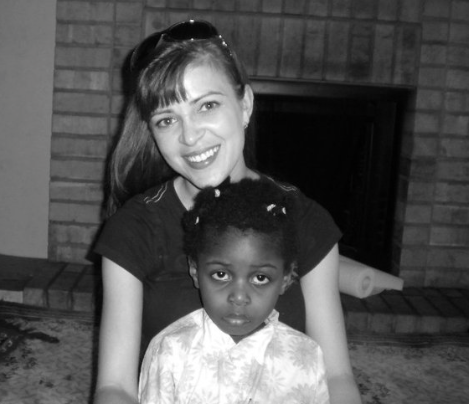simplicity: making our lives about one thing
A few years ago, the Invisible Girls (the five Somali refugee girls I wrote about in my first book) moved from Portland to Seattle, and I drove up every month or two to visit them. On one of the visits, I found that they were living with some of their cousins, who had just come from Somalia. Their cousins sat in the corner for the first hour of the visit, eyeing me with caution and fascination.
They took note of my white skin, my long hair, my jeans and t-shirt, and the way that the Invisible Girls climbed on me, kissed me and sat in my lap.
When the Invisible Girls' mom and aunt went into the kitchen to prepare lunch, one of the cousins, who was 5, slowly stood up, walked across the room and stood in front of me. She didn't speak any English. It was doubtful that she'd ever encountered an American in her living space.
She stood there, silently searching my face. And as we looked at each other, I searched her face too -- it seemed sad, fearful and mournful beyond her years.
She kept standing there, holding my gaze, and I finally realized that she'd seen the Invisible Girls sitting in my lap, and she wanted to be held, too. So I held out my arms and she snuggled into my lap, and spent most of the afternoon there, resting her head against my chest, her little hands holding onto mine. 
***
During Lent, I spent time reading about spiritual disciplines. One of the disciplines that I've read about is Simplicity.
I've always thought about simplicity as "not owning a lot of stuff," or "spending money on what matters instead of buying material possessions." If you asked me what the opposite of a life of simplicity was, I would've said it was a life of debt, clutter and accumulation.
In truth, I almost skipped reading the chapter about simplicity because my life is really streamlined: I gave my car away, I don't own a lot of shoes, I don't have a purse collection (I only have one!), I pay off my credit card every month, and for the past year, all the clothes I had fit into a roller board suitcase. The room I rent is furnished and so is the rest of the house I share with housemates -- I don't own a stick of furniture.
So I almost skipped the chapter, but I'm glad I didn't because what I read surprised and challenged me.
In his book Celebration of Discipline, Richard Foster says the opposite of simplicity isn't the accumulation of stuff. The opposite of simplicity is duplicity. It's being about more than one thing, having competing desires, pursuing mutually exclusive goals.
Are we, as followers of Jesus, called to live simply so we can give generously? Yes, definitely. But buying stuff versus giving money away isn't the starting point. As I Corinthians 13 points out, you can give all your stuff away but if you don't do it out of love, it's empty and hollow and meaningless.
The starting point for anything -- why we live simple lives, avoid consumer debt, wear consignment-store clothes, drive old cars, bring our lunch to work instead of eating out, or make lots of other sacrifices -- is not what we do, but why.
Why do we love the world? Why do we refuse to buy into the lies of materialism? Why do we give generously of our money and expertise and time? Why do we welcome immigrants and refugees? Why do we sacrifice personal comfort and even personal safety in the name of Jesus?
Because we're about one thing.
And, if the Bible is clear on anything, it's clear on this: that the one thing followers of Jesus are to be about is LOVE.
***
To be about Love AND something else -- anything else -- is to be duplicitous. It's to be pursuing opposite goals, mutually exclusive paths. And anything we pursue instead of Love makes our actions and words about love entirely meaningless.
To pursue Love AND something else looks like a lot of things for a lot of people and through the ages, the Church has struggled with duplicity in different ways.
In our current world and cultural climate, I think pursuing Love AND political agendas, pursuing Love AND nationalism, pursuing Love AND safety, pursuing Love AND gun rights, are common ways in which many in the church have become duplicitious.
The picture of the refugee girl with mournful eyes, the memory of the Invisible Girls' three brothers who died before they could get out, the images of Syrian children dying in bombs and drowning on beaches remind me again that to be a follower of Jesus, to practice the discipline of Simplicity, is to be about one thing, and one thing only.
Love.